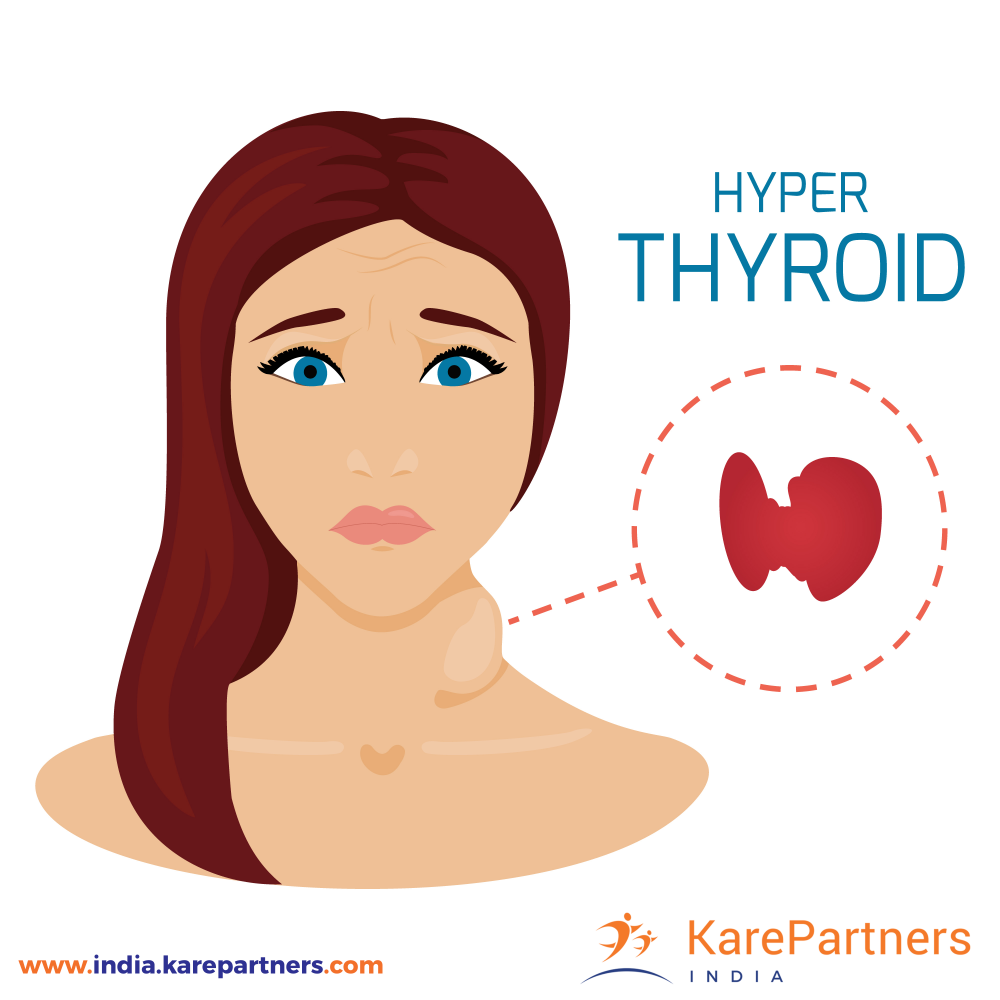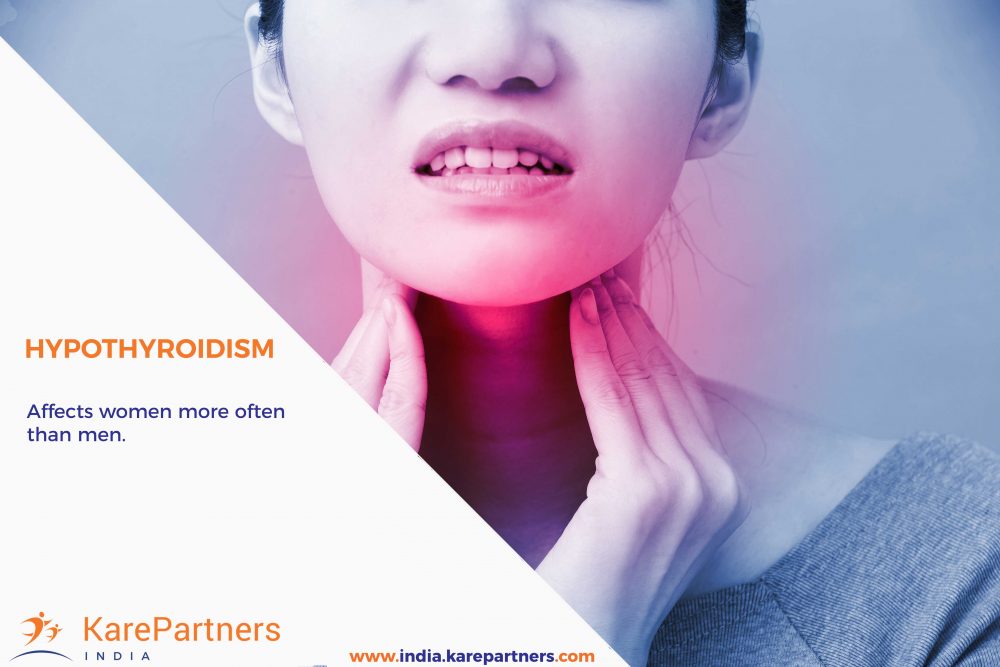Hyperthyroidism
Hyper means excess and thyroidism means disease of the thyroid. Thus, hyperthyroidism is a disease of excessive thyroid activity. Another term that you might hear about this problem is thyrotoxicosis. This overactive thyroid disease is a common condition and people are globally affected by it where the thyroid gland of the person over-functions and produces a lot of tetraiodothyronine (T4) and triiodothyronine (T3), which are two primary hormones that control how the cells use energy.
The thyroid gland secretes hormones into the blood and is located in the neck, and these hormones get transferred into the body’s tissues. The hormone mainly produced by this gland is thyroxine which is converted to triiodothyronine by the body organs, which helps in keeping the body functioning properly.
The use of energy from the food by the body cells is controlled by the thyroid and this process is called metabolism. It affects the body’s temperature, heartbeat, and how well the body burns calories. If the thyroid hormone is overactive and produces too much of the hormone, the metabolism significantly speeds up and causes unpleasant symptoms. Know more about Hyperthyroidism: Causes, Symptoms and Treatment
HYPERTHYROIDISM SYMPTOMS:
Some of the symptoms of hyperthyroidism are:Hyperthyroidism usually begins slowly but in case of some young patients, these changes can be very abrupt. The most common cause of hyperthyroidism is an immune system disorder called Graves’ disease. It’s more likely to affect women under the age of 40. In Graves’ disease (also known as Basedow’s Disease), the eyes may look enlarged and sometimes, one or both eyes may bulge out.
Hyperthyroidism symptoms in women include:
Increase in appetite and sudden weight loss in the body is a cause of overactive thyroid; it is one of the most significant sign as one continues to lose weight despite increasing the food intake.
An overactive thyroid can result in the fast and irregular heart rate of up to more than 100 beats per minute. Other symptoms include heart palpitations, irregular heartbeat, atrial fibrillation, and pounding heart.
Anxiety and tremors are most commonly experienced by women with an overactive thyroid. They are another important indication of overactive thyroid presented with slow trembling or shaking movements of the fingers and hands. Some other symptoms in women are irritability and nervousness; they also tend to develop anxiety or panic attacks, depression, severe mood swings, and unusual behaviour.
Irregular menstrual periods, reduced menstrual flow, or cessation of menstrual periods are some of the symptoms in severe cases. Untreated hyperactive thyroid can lead to infertility problems and frequent abortions in women, also Pregnant women with uncontrolled hyperthyroidism can develop pregnancy complications like giving birth to preterm or stillbirth babies, and the babies born are also at risk of acquiring hyperthyroidism at an early age.
An eye condition called Graves’ ophthalmopathy is associated with Overactive thyroid which affects either one or both the eyes. It is an autoimmune condition that runs in families and most commonly affects women. Some of the other symptoms of this condition include inflammation or swelling of the eyes, eye redness, prominent and protruding eyeballs, resulting in the typical stare; tear formation and discomfort in one or both the eyes, blurry vision, double vision, light sensitivity and limited movement of the eyes.
Other symptoms include sleeping difficulty (insomnia); increased sensitivity to heat and light; muscle weakness; increased sweating; and fatigue. Depression, the Reduced mineral density of the bone resulting in Osteoporosis. Thinning of skin, Excessive thirst, Shortness of breath. Subtle symptoms develop in case of Elderly women like heat intolerance, tiredness, increased heart rate and pulse rate.
Hyperthyroidism causes and treatment:
A lot of different conditions cause hyperthyroidism. An autoimmune disorder, known as the Graves’ disease is the most common cause of hyperthyroidism. It causes antibodies to stimulate the thyroid and secrete high hormone. Graves’ disease occurs more often in women than in men. It tends to run in families, which suggests a genetic link.
Other causes of hyperthyroidism include:
Treatment for Hyperthyroidism:
A common treatment is Antithyroid medications, such as methimazole (Tapazole), that stops the thyroid from making hormones.
A lot of adults with hyperthyroidism are treated with Radioactive iodine as it effectively destroys the cells that produce hormones. Precautions must be taken to prevent radiation spread to others. Some of the side effects of the treatment include dry mouth, dry eyes, sore throat, and changes in taste.
The gland or a section of it is removed surgically and then the patient has to take thyroid hormone supplements to prevent hypothyroidism which occurs when the gland secretes too little hormone.
How does hyperthyroidism affects the body:
Problems related to the thyroid gland, whether they are from hypothyroidism, hyperthyroidism or Graves’ disease reflects the damage to the various systems and organs of the body.
The metabolism gets affected if the thyroid gland is damaged. As a result, weight can be easily gained (hypothyroidism) or lost (hyperthyroidism). Cold hands and feet are also related to a low metabolism caused by hypothyroidism while sensitivity to heat is linked to hyperthyroidism.
The cardiovascular system responds to minimal changes in the amount of circulating thyroid hormones. Hyperthyroidism induces a hyperdynamic cardiovascular state which manifests by a faster heart rate, higher systolic and diastolic function i.e. higher blood pressure, atrial fibrillation, and reduced exercise performance.
Insomnia is often associated with hyperthyroidism. Some of the symptoms and signs of hyperthyroidism can make sleep difficult. The stress of having a “racing” heart or palpitations, rapid pulse (above 100 beats per minute is considered tachycardia), and higher blood pressure can cause lack of sleep.
The central nervous system (CNS) can be greatly affected by a thyroid disorder. The CNS reacts to both too little and too much thyroid hormone. Too much hormone induces anxiety and nervousness. Depression is commonly associated with thyroid conditions.
Hyperthyroidism can decrease the absorption of the sex hormone, progesterone, by the body’s cells and can upset the menstrual cycle.
Hyperthyroidism is linked with Diarrhoea or frequent bowel movements. People with thyroid problems often have food allergies.
Conclusion-
Hyperthyroidism is a condition of the thyroid which requires special attention. Intervention by the Doctor at the right time is a must, leading to controlled thyroid hormones. The Endocrinologist will give a pharmacological regimen which will reduce the symptoms, and help in balancing the hormones, leading to a stable metabolism. The situation where a patient eats more and is still reducing weight is easy to catch on a personal end, and thus seeking medical assistance is easier.

